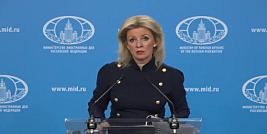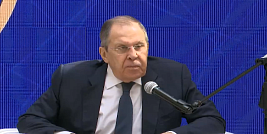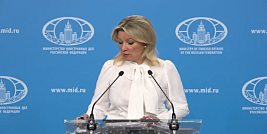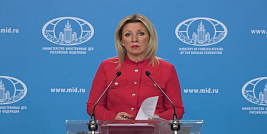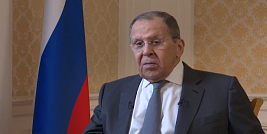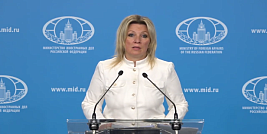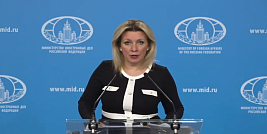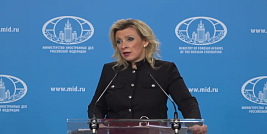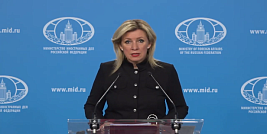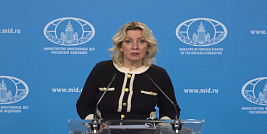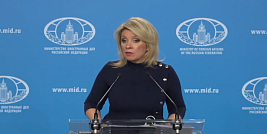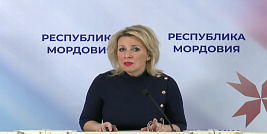Briefing by Foreign Ministry Spokeswoman Maria Zakharova, Moscow, February 18, 2025
- Russia-US talks in Riyadh
- Foreign Minister Sergey Lavrov’s participation in the G20 Foreign Ministers’ meeting
- Ukraine update
- Results of the Munich Security Conference
- Outcomes of G7 Foreign Ministers’ Meeting
- USAID destructive activities in Central Asia
- New Strategy for Countering Extremism in the Russian Federation
- Section: “Keeping Our Promises or History Lessons Hit Hard”
- The 80th anniversary of the completion of the Western Carpathian Offensive (February 18, 1945)
- Russia’s efforts to preserve the languages of indigenous peoples
- Defender of the Fatherland Day
- Ceremony to honour the publication in Russian of a short stories collection by Pakistani writer Saadat Hasan Manto
- Anti-Russia forces uniting in Europe
- Moldova’s plans to close the Russian Science and Culture Centre in Chisinau
- Expectations from the talks in Saudi Arabia
- Ukraine’s non-accession to NATO
- Lifting anti-Russia sanctions
- Christoph Heusgen’s Russophobic statements
- Vladimir Zelensky’s statements
- Professor Alexander Gaponenko’s arrest in Riga
- The situation in Lebanon
- Russia-US dialogue
- The role of the US in the conflict in Ukraine
- The United States changing its rhetoric on Russia
Without a doubt, all eyes are riveted to Riyadh, where Russia-US contacts are taking place in accordance with the instructions issued by the presidents of the two countries.
The sides are having a short break at this particular moment, and will soon resume the negotiating process. We have a vast number of questions about the details of the talks and the negotiating positions of the parties.
Please note that after the talks Foreign Minister Sergey Lavrov will talk to the media. I understand that you can’t wait to ask him questions, but please be patient and you will soon get the chance to get access to first-hand information.
Foreign Minister Sergey Lavrov’s participation in the G20 Foreign Ministers’ meeting
At the most recent briefing, we provided detailed information about Foreign Minister Sergey Lavrov’s participation in the G20 kick-off Foreign Ministers’ meeting in Johannesburg on February 20-21. This is a landmark event for Pretoria and the entire African continent, which will be hosting a G20 event for the first time ever.
The Foreign Minister will provide a thorough analysis of the international situation focusing on root causes of ongoing developments, and outline concrete steps to overcome destructive phenomena.
Efforts are underway to schedule the Minister’s meetings with his counterparts on the sidelines of the meeting.
Today marks the 11th anniversary of tragic events in central Kiev, which went down in history as the armed anti-constitutional coup. On February 18, 2014, an allegedly peaceful (as was maintained back then) anti-government Euromaidan rally escalated into massive violent riots.
The headquarters of the ruling Party of Regions was seized and burned down. Its employees were killed. The protesters attacked members of the Berkut police force and other law enforcement agencies. Western organisers, sponsors and orchestrators of street fighting which unfolded under eye-catching slogans of “better European life, democracy, human rights and fighting corruption” ruthlessly drove the rally attendees forward. The human shield tactic is their tactic of choice. In reality, it was a generously-paid-for, sponsored, and externally supported and organised attack on democracy, not a rally in support of democracy. These mass riots were organised in order to overthrow the legitimate government in Ukraine.
For reasons that have so far remained vague, this bloody putsch was dubbed “Revolution of Dignity” in the Ukrainian political discourse. The dictionary of the Ukrainian language provides two definitions of the word “dignity,” but neither has anything to do with the tragedy that unfolded during Maidan protests, or Ukraine as it is today.
The first meaning is “a set of traits describing positive moral qualities.” What particularly in those events was a manifestation of “positive moral qualities?” Was it the seizure of government buildings by a riotous mob, the killing of law enforcement officers, or eagerness to sell the country for a few cookies handed out by then US Under Secretary of State Victoria Nuland to Maidan protesters? Was it, perhaps, the humiliation of the Ukrainian law enforcement officers who were brought to their knees? Criminal cases were brought against them, and a massive persecution campaign ensued.
The Kiev authorities - the Kiev regime - never came up with clarifications about which of the above was proof of positive moral qualities. Their promises to investigate Euromaidan crimes and the May 2, 2014 tragedy in Odessa, to bring the culprits to justice, and to ensure the rule of law have remained an empty sound so far.
The second meaning of the word “dignity” is about “a person’s realisation of his or her civic weight and civic duty.” I wonder how Ukrainians measure civic responsibility of the nationalists who beat up and kill everyone who disagrees with their ideology (coincidentally, precisely based on the principle of rejection, and the linguistic ethnic principle). Where is civic responsibility and “weight” of those who seize churches or destroy monuments and memorials? Is Ukraine proud of the fact that speaking Russian can get a person reported to the authorities, persecuted, or violently assaulted? What does violence really mean? It’s about all things, including murder and violent assaults. Which of the above fills the people of Ukraine with a sense of civic weight?
In the winter of 2013-2014, Ukrainians took to the streets because they wanted changes for the better. They had a lot of problems. In fact, where on planet Earth are there few? What did they get? Did they get what they wanted? Did they achieve what they went to the Euromaidan for? The answer is obvious.
Euromaidan resulted in a deep split in society, repression, and fight against dissent, rampant nationalism and neo-Nazism, legal chaos and nihilism, as well as countering ethnic and peaceful forms of culture and history, and full degradation of the socioeconomic situation in the country.
Despite the developments, in February 2014, there was still real chance to settle the political crisis in Ukraine peacefully. Only one thing was required: to implement the agreement signed between the authorities and the opposition on February 21, 2014, with the mediation of Germany, France, and Poland.
Let us have a look on these countries’ stance regarding Ukraine now. How does this align with the fact that, above all, they deceived the people of Ukraine in the first place with their mediation back in 2014? Just like they (including France and Ukraine) did all seven years after signing the Minsk Agreements, or like they have been deceiving the people of Ukraine for all these years telling them that victory is not far away, and they will certainly lead the people of Ukraine there. In fact, they clearly understand that this is, above all, the West’s war against Ukraine.
Back then, this did not happen. In February 2014, the West did not leave the Ukrainians any chance. The agreement between the government and the opposition in Ukraine was then discarded by the winners of the Revolution of Dignity as an unnecessary obstacle on their way to government positions. It was rejected just hours after the signing. It was brought to the crowd as evidence of the authorities’ alleged capitulation, although this was not the case.
In their turn, the Westerners, including the mediators, just acknowledged the change of power in Ukraine, instead of calling on the radical nationalists to comply with their obligations under the agreement. They began encourage the putschists in their anti-Russia and Russophobic policies. In fact, this is when the conditions were created for what will later be called the Ukrainian crisis, which took many thousands of lives and crippled the destinies of nations.
The Ukrainian militants, who got an indulgence from the supposedly enlightened Western pseudo-democracies, continue terrorising civilians and attacking civil infrastructure in Russian regions today.
On February 12-17, Ukrainian UAVs delivered targeted strikes at civilian vehicles and facilities in the Belgorod Region, killing six people and wounding at least eight.
We return to this topic during every briefing. But a beast has emerged. During the Munich Security Conference, we heard High Representative of the European Union for Foreign Affairs and Security Policy Kaja Kallas say that Russian civilians are allegedly not suffering, getting killed or crippled. I refused to believe that it was not fake news but we double-checked it. We saw the video and realised that these people have no conscience. Having full information, with names and dates of birth that we provide on the Russian citizens, residents of the regions that have become victims of the Kiev regime, they publicly repeat at international platforms that no such thing is happening.
No such thing happened in Bucha where to this day, nobody provided a single name or a date of birth. Not a single photo of alleged victims of the Russian army. Because it was all staged. For every person among the civilians that fell victim to the Kiev regime, we can give you facts, names and dates of birth.
On February 12, several residential areas in the DPR were attacked by the Ukrainian Nazis. One person was killed, at least 15 people were wounded, including a teenager born in 2006.
The Banderites are hunting down passenger buses. On February 12 and 13, a city bus and two mini-buses in the Nikitovsky District of Gorlovka (DPR) found themselves under fire. On February 14, a Ukrainian drone attacked a coach on the road connecting Pologi and Chapayevka in the Zaporozhye Region. The driver sustained concussion.
On February 16, as a result of a drone strike in Slavyansk-on-Kuban in the Krasnodar Territory, a four-year-old girl sustained serious injuries. They will be held accountable for this. And we are already punishing them.
Russian courts continue to issue verdicts to the Ukrainian neo-Nazis and mercenaries who committed war crimes.
The militants of the 22nd Separate Mechanised Brigade of the Ukrainian Armed Forces Sergey Zavatsky, Anton Furdalenko, Vasily Taran and Ruslan Savvakis, detained on August 13, 2024, have been found guilty of committing terrorist acts against the civilians and the Russian military in the Kursk Region. Zavatsky has been sentenced to 16 years and the others to 15 years each.
Georgian mercenary Gele Khozrevanidze has been sentenced to 13.5 years in absentia. He is on the international wanted list.
A criminal case has been filed with court against British foreign combatant Christopher Garrett, who fought between January 2015 and December 2017 with the Neo-Nazi Azov unit (recognised as a terrorist organisation and prohibited in Russia) and with an international legion between February 2022 and November 2024.
Russian law enforcement agencies will continue to hold Ukrainian Nazis and foreign mercenaries accountable for war crimes and other crimes.
Now, to the events that all these European and Western human rights “diplomats” and representatives of international organisations will be silent about – the inhumane treatment of Russian prisoners of war.
The Investigative Committee recorded new incidents of inhumane treatment of Russian POWs by Ukrainian neo-Nazis, in violation of international law. One of our wounded captive fighters sustained further physical injuries at the Kharkov Detention Facility. He was forced to sign documents discrediting the Russian Armed Forces, and to serve in the Ukrainian Territorial Militia. Another Russian serviceman was kept in a pit by Ukrainian militants who wanted to obtain information about the Russian army. A criminal case has been opened on the use of prohibited methods and means of armed conflict.
A criminal case has been filed against Alberto Rojas, a journalist with Spanish newspaper El Mundo. According to investigators, he illegally crossed the Russian border in February 2025 together with neo-Bandera units and headed towards the Sudzha District of the Kursk Region. While there, he met with pro-Bandera supporters from the 47th Brigade of the Armed Forces of Ukraine.
This is by no means the first case when foreign correspondents illegally surface on the territory of our country for the sake of covering the “feats” of Vladimir Zelensky’s army.
They violate the law of the Russian Federation. Russian law enforcement agencies talk about this, while passing the relevant sentences. However, these people also violate the code of journalist ethics because they are propagandists. They also violate universal human morality because they promote violence.
We can see that the West is reacting nervously to Russian-US contacts, and this reaction borders on the verge of panic. One is surprised to see how the West is reacting to Russian-US contacts. How can this reaction be possible when the United States is also part of the West? It turns out that this is quite real.
Top-level and high-level Russian-US contacts are causing a real hysteria among Russophobic Euro-Atlantic circles. We are witnessing an unprecedented phenomenon in international relations: Europe is demanding that it be allowed to take part in the negotiating process. British-EU friends of the criminal Zelensky regime are displaying their inability to transcend the boundaries of their own primitive concepts (that aim to wage a war against Russia to the last Ukrainian). EU Commissioner for Defence and Space Andrius Kubilius is saying time and again that an equitable peace is impossible without boosting Ukraine’s might. I am asking EU representatives: Look at Ukraine, what have you done to it? Look at this country’s people and citizens. What kind of might do you want to boost? Ms Kaja Kallas who has become completely intoxicated with Russophobia has gone as far as to defend militants from the Armed Forces of Ukraine who, in her distorted mentality and vision, do not kill peaceful Russian women and children.
We are talking about this at every briefing. Every day, the heads of our regions, public organisations, the Presidential Commissioner for Children’s Rights Maria Lvova-Belova discuss outrages perpetrated by militants from the Armed Forces of Ukraine. Reports are published. The Ambassador-at-Large of the Russian Foreign Ministry for Crimes of the Kiev Regime, Rodion Miroshnik, holds news conferences. But all the information does not reach Kaja Kallas. She has all the data. They are simply lying. They want to justify themselves before their own citizens and to justify the failure of their own policy. This is why they are ready to facilitate the murder of Ukrainian citizens by supplying their weapons. They are ready to lie to their own people. Each time, we will highlight these fakes, expose them and provide answers.
Against the backdrop of the rapidly changing geopolitical situation, this flawed mental logic primarily highlights despair, anger and weakness. Yes, weakness. No matter how hard they try to prolong the agony of the Kiev junta, they will accomplish nothing. Unfortunately, even more Ukrainian citizens will be killed because they have become victims of deception and a criminal aggression. Western countries involved them in this aggression under the slogans of democracy, economic well-being, etc. Sooner or later, they will have to answer for their deeds. Consequently, numerous representatives of European elites, accomplices to brutal and bloody crimes of the neo-Nazi regime, nurtured by them, might be brought to account for assisting contemporary pro-Bandera supporters in Ukraine.
Their more frequent attempts to draw similarities between Nazi Germany and the Soviet Union are absolutely worthless and ungrounded. I would like to recall that the Soviet Union had routed Nazism and fascism, liberated its own territory and eventually started liberating Europe. All this stems from the fear of EU and NATO representatives that Ukrainian neo-Nazis will inevitably be defeated; moreover, they are afraid of assuming responsibility before their own nations. Apart from throwing Ukraine under the bus to please their own ambitions and a morbid perception of the world and their global role, they have wrecked the well-being of their own nations.
On February 12 of this year, the Verkhovna Rada passed a law establishing the “national prayer day,” February 24, in Ukraine. The explanatory note thereto says that “the common prayer will protect Ukraine and those who continue the fight on the battlefield and become a testimony to the spiritual unity of the Ukrainian people and a symbol of firm confidence in victory.”
Everything got mixed up. It’s an impossible mess. What “spiritual unity of the Ukrainian people?” Vladimir Zelensky and his Western puppet-masters have shattered the Ukrainian Orthodoxy. We see Orthodox churches being seized and shared. They film talk shows and food feuds in former monasteries. They give the green light to any kind of dark arts. Cathedrals are being turned into God knows what. People are chased from their churches. They are imprisoned and criminalised. They are forced to swear allegiance to the schismatics. And after that they have the cheek to talk about “common prayer” and “spiritual unity?” This could be if people or social groups failed to find common ground. But then the government should have come into its own and separated those unable to coexist or found a way to reconcile them. In this case, however, we have an opposite situation. People in Ukraine lived in harmony for decades. At least the Orthodox believers did. A criminal order was issued with regard to the Ukrainian Orthodox Church in order to make yet another step towards severing the historical and spiritual ties between Russia and Ukraine, between the Russians and Ukrainians. They went the whole hog. They have invented a new sectarian movement. They have invented a method to take over monasteries and churches. They have found a way to pit believers against each other. And now, lo and behold, they come up with a day for “common prayer.”
There is yet another aspect to this problem. They talk about praying for the Armed Forces of Ukraine (AFU) that are terrorising civilians both in Ukraine and Russia. So it turns out to be a prayer for the Nazi evil, doesn’t it? Literally, they are sanctifying the evil. Moreover, given the Zelensky-led gang’s policy to eliminate the country’s largest religious denomination – the canonical Ukrainian Orthodox Church – this step is not only hypocritical but also confirms that religion is just a political tool for the Kiev-based junta that is frantically clinging to power.
A fight is on against history, monuments and memory in Ukraine. According to media reports, the Ukrainian Nazis have pulled down, in Nikolayev, the monument to Hero of the Soviet Union Viktor Lyagin, an intelligence officer and the head of the local anti-fascist underground, who was executed by the Nazis in 1943. The neo-Nazis fired at the monument in 2025. Combating the historical truth and glorifying the Nazi butchers is what the Kiev regime is openly doing now with approval support from its Western masters. This approval is just one part of it. The other is a direct order.
The above facts once again confirm the relevance of the special military operation as a means of denazifying and demilitarising Ukraine and removing the threats emanating from its territory. As the Russian leaders repeatedly stated, all the aims of the special military operation will certainly be reached.
Results of the Munich Security Conference
The 61st Munich Security Conference stunned all those who wanted to stage yet another “feast of Russophobia.” In recent years, as a matter of fact, this event took place exactly in this way. They did not discuss security issues, focusing on nothing but aggression, namely, how to stoke a roaring fire under the “cauldron of war” and wake up the “volcanoes of conflict” so that everyone forget about peace for a long time to come.
The Munich Conference has demonstrated what we stated time and again. I am referring to our conviction that the Western world has long ceased to be a paragon of security and democracy. An event, that was conceived by its founders as a platform for analysing the trends and formulating the ideas of North Atlantic security policy has, in effect, boiled down to a squabble between actors representing the two shores of the Atlantic. All of that was generously spiced with Russophobic rhetoric.
No one has heard any constructive ideas with regard to building security architecture in Europe and the world as a whole. This was not what they came for this time or for that matter all previous years. It was the same threadbare story about the “Russian threat” to the EU and NATO. They claimed again that the only “prescription” for peace was boosting their military spending by an order of magnitude. It’s funny to hear that for the umpteenth time. This is no prescription for peace but a ruse for preserving their agonising hegemony.
In the first place, the conference should have discussed the mistakes committed by the Euro-Atlantic cronies. Second, how they might bow out of their criminal policy. Third, what they could do to mend their ways. But no, they were not interested. As a caveat from the outset: the “enlightened” Europe is yet to decide what social outlays to cut in order to raise funding for new crusades, and they are no longer so sure of support from their overseas master.
The European sponsors of the Kiev regime aired their usual assurances of “unflagging” support for Ukraine. For lack of ideas on how to emerge from the European security crisis, the participants in the conference gave a standing ovation to the Ukrainian stand-upper, Zelensky, with his claim to leadership in forming a European army and expectations with regard to new handouts from the West. Feting former and current Nazis seems a fresh tradition with them.
But this also amounts to a mockery of Ukrainian citizens. The European leaders insult the Ukrainians by saying that Zelensky can aspire to leadership in raising a European army. Let me note that Ukrainian citizens can now officially join the AFU at age eighteen. As is clear, they will not be army staff hands, nor IT specialists, nor computer operators, nor even drone controllers. No, they will be cannon fodder, assault troops, and a human shield for Zelensky.
In the year of the 80th anniversary of Victory, the Munich Security Conference “distinguished” itself by honouring former and current Nazis. The MSC Chairman, Christoph Heusgen, called the conference a “nightmare for Europe.” But it is Europe itself, not the conference, that presents a problem. It has long been unable to assess the surrounding reality in a sober-minded manner. It subsists on far-fetched narratives. It is preparing for a war with Russia instead of making an effort to improve the living standards. It continues to devastate its industrial sector and build up the military budgets instead of solving social and economic problems. It is involved in a hunt for “Russian spies” who have allegedly inundated Europe instead of fighting illegal migration, crime and terrorism. It encourages political censorship and imposes restrictions on alternative information sources instead of showing regard for freedom of expression. Judging by comments from most European politicians, they are not going to come to their senses and get cured of the Russophobic political fever.
The world is laughing at Western Europe. Terrorists launch attacks in the centre of European capitals. They have nothing to do with Russia. But the West continues to say their mantras about the threat coming from our country. They do not respect freedom of expression. Quite the contrary, they encourage political censorship, impose restrictions on alternative information sources, and block the dissemination of information as such. Living in a vacuum, they are plunged in yet another “nightmare.” Isn’t it high time to air the room, let in some fresh air, come to, look out the window, and see what is going on outside?
Judging by what most European politicians say, they are not ready to recover from their Russophobic political frenzy, which is regretful.
Outcomes of G7 Foreign Ministers’ Meeting
Media reports covered the February 15 meeting of the G7 foreign ministers in Munich, Germany. We noted that the joint statement issued after this meeting once again contained threats against Russia. Specifically, it suggested that if the G7 members spot a lack of goodwill from Russia with regard to talks regarding the “end of the war against Ukraine,” they will seek to impose “even greater costs” on us, including through the hydrocarbon price cap mechanism.
However, the G7 representatives previously stated that the time for negotiations had not yet come and that the situation was not “ripe.” Wasn’t it US Secretary of State Antony Blinken who said this? Weren’t these statements made by senior EU foreign policy officials and foreign ministers from the G7 countries? This goes beyond hypocrisy straight into the realm of a political circus.
We have more than once provided our assessment of the G7’s political nature. Once a platform for coordinating responses to key global challenges, it has now deteriorated into a mechanism for exerting pressure on the countries that do not conform to its agenda and churning out meaningless anti-Russia initiatives. The group has tarnished its reputation with disgraceful actions and decisions.
It is naïve to believe that this closed club has any real influence in today’s international landscape. The G7 is an outdated format that has lost its credibility. It plays no constructive role in global development or stability.
If they believe otherwise, let them present concrete results of their work. Aside from anti-Russia rhetoric and nationalist statements filled with unadulterated hatred towards those they label as enemies or opponents, what have they actually achieved?
Russia, on the other hand, has made a clear choice in favour of real global governance mechanisms, particularly through BRICS and the SCO. These entities represent key centres of economic growth and political influence in the emerging multipolar world. Their efforts are constructive and yield tangible results, which is why we plan to continue cooperating with them.
USAID destructive activities in Central Asia
There’s more to the West’s aggressive and destabilising politics. I’m referring to the USAID. New details have come to light.
As the new US administration continues to expose the Democratic legacy in foreign aid, an increasing number of countries are becoming aware of the true nature of so-called “soft power” tools, among them the US Agency for International Development. Among other things, this organisation engaged in keeping morbid and warped ultra-liberal narratives afloat and interfered in the domestic politics of a number of countries to advance agendas that favoured the United States, and derived benefits from such meddling.
It is gratifying to know that countries that are friendly to Russia have started a serious discussion on this issue. Recently, Kyrgyzstan’s top leadership supported the idea of shutting down the US-funded Radio Liberty global network, accusing its local branch of spreading false information and manipulating news. At the same time, the country’s legislators have raised concerns about US NGOs providing financial support to the opposition.
Members of the Kazakhstani Parliament have also called for an audit of USAID’s activities questioning the financing of harmful projects from imposing foreign neo-liberal values on society to blatant political interference, including sponsoring anti-government protests, which constitutes gross intervention in domestic affairs.
Russia has long warned that US international development programmes pose more risks than bring actual benefits, which is why the latest news from across the ocean didn’t come as a surprise to us, but merely confirmed what we’ve been saying for years on end, including to our friends as well.
We are ready to work as a team to cut short external attempts to undermine stability and security in our shared space under the false pretext of promoting democracy.
New Strategy for Countering Extremism in the Russian Federation
Combating extremism today is objectively becoming a specific area of cooperation between states, going beyond the common problems of countering terrorism. This is primarily due to the growing problem of the radicalisation of people on a global scale, which is caused by the spread of various ideas and practices that poison society, incite inter-faith and inter-ethnic discord, destabilise the traditional foundations, and undermine the constitutional order, sovereignty, and stability of states across the globe.
These radical ideologies are not born in vacuum. Unfortunately, they thrive because of the cynical policies of certain countries that are willing to wage information wars, provoke armed conflicts, and inspire state coups from outside for their own self-serving reasons.
In these conditions, the ability of most states to withstand extremism depends on their own capabilities in view of all the nuances of their national contexts rather than on pseudo-universal one-size-fits-all recipes imposed allegedly on behalf of the international community.
We are convinced that security against extremist risks is a major task for ensuring a stable and independent existence of any country. Moreover, building own development trajectories is equally a mandatory condition for building a multi-polar and just world order. Therefore, Russia is determined to protect the right of any state to assess internal and external threats independently, and to determine its national priorities and approaches to combating both violent and ideological manifestations of terrorism and extremism based on these assessments.
By Executive Order No. 1124 of December 28, 2024, President Vladimir Putin approved an updated Strategy for Countering Extremism in the Russian Federation.
I should point out that this conceptual document (the previous Strategy was valid from 2020 to 2025) is now extended, more comprehensive and valid for a longer term. The strategy reflects new trends in countering extremism that emerged from the special military operation and the hybrid war unleashed by the West against our country.
The text incorporates several provisions of the Russian Foreign Policy Concept that reinforce the general foreign policy paradigm with regard to countering extremism. This includes significant adjustments to the scope of concepts, clarification of tiers and sources of extremist threats, and introduction of connections between neo-Nazism and extremism. The document clearly establishes the primary role of the state and competent authorities in countering extremism, with civil society playing an auxiliary function, mainly in preventing extremist activities.
The document stipulates one of Russia’s key views that any attempts of foreign interference in the domestic affairs of states are unacceptable, and no terrorist groups or other extremist forces can be used for geopolitical purposes. The document stresses the importance of fighting dissemination of any terrorist or extremist ideology, including the neo-Nazi ideology.
The Strategy accumulates Russia’s progressive experience in preventing radicalisation, especially that of youth, immigrants, prisoners serving sentences, and other social categories highly susceptible to extremist ideas.
A set of measures has been established to prevent the use of information technology, including the internet, for terrorist and extremist purposes, with special focus on neutralising the negative impact of foreign intelligence services, NGOs and foreign agents that aim to provoke and inspire colour revolutions in Russia.
We suggest that all interested international partners carefully review Russia’s best practices in combating extremism that have formed thanks to years-long targeted extensive work of all government bodies and the efforts of the consolidated Russian society that truly has a high civil immunity against any extremist threats.
Section: “Keeping Our Promises or History Lessons Hit Hard”
Recently, French Foreign Minister Jean-Noël Barrot obsequiously thanked the United States for liberating France from Nazism and emphasised the importance of working together to achieve “greatness.”
As usual, he forgot to mention the Soviet Union’s contribution to liberation of France. I quote, “Europe and France have never been greater than when they fought for freedom alongside the United States. This is the story of Lafayette and the US soldiers liberating France. This year marks the 80th anniversary of liberation of France. We will support the United States, ensure our shared greatness, and push for freedom around the globe.”
We have no intention of competing with France over who contributed more to independence of the United States. However, since Marquis de Lafayette was mentioned, I cannot resist citing a letter addressed to him in the spring of 1779 by George Washington, then Commander-in-Chief of the Continental Army, “We are not a little pleased to find from good authority, that the solicitations and offers of the Court of Great Britain to the Empress of Russia, have been rejected with disdain.” Washington emphasised Catherine II’s firm refusal to enter into any alliance with Britain, noting that the imperial government justified its stance in terms (!) reflecting respect for human rights.
That’s a brief mention of US history. We could also discuss how Russian naval squadrons supported Abraham Lincoln during the American Civil War, preventing Britain and France from intervening on the side of the Confederacy. But we’ll leave that for another occasion when someone else tries to distort historical facts.
For now, let’s focus on France. It’s quite possible that Jean-Noël Barrot doesn’t understand most of what I just said. So I’ll use plain language in hopes that he gets the message. I will now comment on his claim about liberation and greatness.
The Allied landing in Normandy on June 6, 1944, was undoubtedly a crucial turning point in liberating France from Nazi occupation. However, only an ignoramus would consider Operation Overlord in isolation from events on the Soviet-German front. That same June, the Soviet Union launched Operation Bagration, one of the largest WWII battles aimed at defeating Germany’s Army Group Centre and liberating Belarus.
As early as 1940, Russian emigrants in France formed one of the first Resistance groups, known as the Musée de l’Homme led by Anatoly Levitsky and Boris Vildé.
In 1943, the Central Committee of Soviet Prisoners of War in France was established, headed by Red Army Senior Lieutenant Mikhail Slobodinsky and French communist Boris Matline (a son of Russian emigrants known as “Colonel Laroche.”)
The legendary all-female partisan unit Rodina fought against the Nazis near the French town of Thil. It was formed by two women from Soviet Belarus Nadezhda Lisovets and Rosalia Fridzon.
Around the city of Lens, Soviet partisans led by Vasily Porik waged fierce battles against the occupiers (Porik was posthumously awarded the title Hero of the Soviet Union). France was also home to the 1st Soviet Partisan Regiment commanded by Major Andranik Kazaryan.
Does the French Foreign Minister know about this? Of course, not. That would require studying history, at the very least the history of his own country, rather than feed on ready-to-consume narratives.
We hope that Monsieur Barrot won’t try to refute what Charles de Gaulle said in 1944, ”The French people know that it was Soviet Russia that played the decisive role in their liberation.” Or, has modern-day France decided to cancel de Gaulle as well?
Let me remind them why Charles de Gaulle said so. He said it after witnessing the devastation of Stalingrad. Most French people once shared his opinion until they became victims of the antiscientific approach to history, where inconvenient pages could simply be torn out and replaced with official narratives. It is no coincidence that even today, dozens of streets and squares in France bear the name of the city that became a symbol of the decisive turning point in World War II.
Perhaps French Foreign Minister Jean-Noël Barrot should buy a history book, read something and learn some new facts about his own country and its people?
Here’s a well-documented fact for his collection: liberating Paris was not a priority for US General Dwight Eisenhower in 1944. The city was liberated swiftly and with relatively small forces. First, the Resistance composed mainly of communists and former Soviet prisoners of war rose up in revolt. Many may have forgotten this, but I’ll remind them of it.
At least six partisan groups, consisting of Soviet POWs and Russian emigrants, took part in the liberation of Paris. Captain Steverov’s unit held the Asnières Bridge for an entire day, preventing German tanks from entering the city. How shameful it is that today’s so-called French statesmen have forgotten this heroic feat. A group led by emigrant Leonid Savinkov took the building of the Soviet embassy and raised the red flag over it.
This is what gave Charles de Gaulle the right to declare that Paris had won its own freedom and was liberated by its own people. Only after the uprising was well underway did the US 4th Infantry Division and the French 2nd Armoured Division arrive to support them. In fact, Spaniards - former Republican fighters -who also accepted the surrender of the German commandant were the very first troops to enter Paris. A fitting revenge for Madrid 1939. No pasaran!
Back then, thanks to a united effort, fascism was truly defeated. But today, due to the actions of “free Europe,” it has returned in the guise of neo-Nazism.
Having won its own freedom, Paris was liberated with the support of all of fighting France. Unlike the United States and Britain, the Soviet Union instantly believed in the future of Free France led by General de Gaulle and established close interaction with him. It was at his order that the legendary Normandie squadron was created in 1942 (the Normandie-Niemen Regiment since 1944), a vibrant symbol of Franco-Soviet brotherhood in arms.
The significant contribution of Russian emigrants and Soviet prisoners of war to the formation of the French Resistance is notable as well. I encourage the French Foreign Minister read the article by Russian Ambassador Alexey Meshkov ”Soviet Citizens and Russian Emigrants in French Resistance” published in the French Histoire Magazine on December 21, 2024.
I understand that given the current state of French diplomacy this text may be difficult to grasp. But he should make the effort and read it, especially so since he chose to speak on this subject.
It is also impossible to agree with Jean-Noël Barrot’s claim that “Europe and France have never been greater than when they fought for freedom alongside the United States.” The Americans have never viewed Europeans as truly equal allies or partners. There has always been an inverse relationship between France’s true greatness and its alignment with the United States. Charles de Gaulle knew it well and saw cooperation with the Soviet Union as an indispensable prerequisite for his country’s greatness.
And if Jean-Noël Barrot should feel the need to thank anyone for France’s post-war greatness, it should be Joseph Stalin. It was Stalin who ensured that the Fourth Republic received the status of a victorious power in World War II and a permanent seat on the UN Security Council.
French history has known leaders capable of great deeds in the name of their nation’s interests. Interpretations of what they accomplished may vary, but one thing is clear: however the current French Foreign Minister’s words may be construed outside France, they are, first and foremost, a disgrace to the French people, because he does not know the history of his own country.
But we are here to help. We will always stand guard, including over France’s history.
The 80th anniversary of the completion of the Western Carpathian Offensive (February 18, 1945)
On January 12, 1945, the Western Carpathian Strategic Offensive was launched in order to defeat the German forces defending the Western Carpathians and reach the Moravia-Ostrava industrial region in Czechoslovakia, an important economic hub for the Nazi Germany. Czech enterprises, particularly the weapons manufacturing factories that are still famous today, regularly provided their products for the needs of the Wehrmacht.
The operation was carried out by the troops of the 4th Ukrainian Front commanded by General Ivan Petrov, with support by the main forces of the 2nd Ukrainian Front commanded by Marshal of the Soviet Union Rodion Malinovsky. The Czechoslovak 1st Army Corps, which was a part of the 1st Guards Army, fought alongside our soldiers, something Prague does not like to remember today. The Soviet troops fought against German Army Group A, which included units of the 17th Army, the 1st Panzer Army, and the 1st Hungarian Army.
Within one week, the Soviet troops advanced by 80 km. On January 19, Prešov and Košice were liberated, with the Czechoslovak 1st Army Corps also taking part in the liberation efforts. In mid-February, troops of the 4th Ukrainian Front liberated the city of Bielsko-Biala, reaching the source of Vistula River. On February 18, the troops of the 4th Ukrainian Front went on the defensive, successfully completing the active phase of the operation, while the 2nd Ukrainian Front troops continued offensive operations until mid-March, forcing Hron River.
The successful offensive of the 4th Ukrainian front in the severe winter conditions and in mountainous terrain, with the minimum advantage over a well-fortified enemy, can only be compared with Field Marshal Alexander Suvorov’s iconic crossing of the Alps in the late 18th century, which is, without exaggeration, a heroic deed and an example of the military art of fighting “not by number, but by skill.”
The Western Carpathian operation was an essential stage in delivering a decisive blow to German troops in Central Europe. As a result, the Soviet troops advanced 170-230 km to the west, liberating the southern regions of Poland and part of Czechoslovakia’s territory.
For courage and heroism on the battlefield, 149 units and formations were awarded orders, and 42 formations and units received honorary titles.
Russia’s efforts to preserve the languages of indigenous peoples
February 21 marks International Mother Language Day, established by the decision of the UNESCO General Conference in 1999 to draw attention to the need to maintain and promote linguistic and cultural diversity.
Russia actively promotes its experience of preserving the languages of indigenous peoples, including at UNESCO. Russia has made a top contribution to the implementation of the International Decade of Indigenous Languages in 2022-2032.
Russia holds large international conferences on the support of mother tongues and the use of information technologies as a tool to promote linguistic diversity. In particular, this topic was addressed at the 6th International Conference Information and Communication in the Digital Age: Tangible and Intangible Impacts (Khanty-Mansiysk, June 18-20, 2024) and the second High-Level International Conference World Treasury of Mother Tongues: Nourish and Cherish (St Petersburg, June 30 - July 2, 2024), which brought together over 200 experts representing 40 countries.
Focus is also placed on introducing computer speech recognition tools and designing new fonts for minority languages, which is necessary for their full existence in the digital environment.
The Information for All programme committee under the Commission of the Russian Federation for UNESCO is implementing the My Native Language programme, which covers more than twenty languages in Russia. Three almanacs on the best practices of Russian language policy have been published, which are distributed on the UNESCO platform.
Days and weeks of languages and literatures of the indigenous peoples of the Russian Federation are held with the Commission’s assistance. The Day of Literatures of the Finno-Ugric Peoples, which took place in October-November 2024 in Khanty-Mansiysk, celebrated the works of Finno-Ugric writers living in Russia.
Russia is ready to share experience with all interested partners and is ready to adopt the best practices.
Defender of the Fatherland Day
On February 23, Russia marks Defender of the Fatherland Day.
This celebration is especially relevant because this year has been declared the Year of the Defender of the Fatherland to mark the 80th anniversary of Victory in the Great Patriotic War of 1941-1945. The theme of the year reflects such priorities of today’s Russia as patriotism, continuity of generations, and the unwavering respect for the defenders of the Fatherland at all times.
Let me remind you that for the first time, this day was celebrated on February 23, 1919, to coincide with the anniversary of the glorious victories of the Red Army that defended the Fatherland from foreign occupation.
In 1946, after the Great Patriotic War, it was given a new name: the Day of the Soviet Army and Navy.
The Russian Federation carried on with the good tradition by preserving the original meaning of the day. The holiday was established by Federal Law No. 32-FZ On the Days of Military Glory and Memorable Dates of Russia dated March 13, 1995.
Defender of the Fatherland Day reminds us of the glorious military past of the country. We pay tribute to the military feet of everyone who fought for their homeland at various times as well as today’s heroes: everyone who defends Russia with weapons in hands and shows real heroism and true courage in the special military operation zone every day.
On February 26 at 5 pm Rudomino National State Library for Foreign Literature with the support of the Embassy of Pakistan in Moscow will host a ceremony to celebrate the publication in Russian of a collection of works by famous Pakistani writer Saadat Hasan Manto.
He is a recognised master of the short story. The first half of the twentieth century was the time of his creative work. His works, which are a valuable literary treasure, have been translated into dozens of languages and are popular all over the world. Now they are available in Russian.
Saadat Hasan Manto's collection of short stories is the second book of translations of Pakistani writers published with the support of the Embassy of Pakistan in Russia. Earlier, a collection of poems by great Pakistani poet Faiz Ahmad Faiz was published in 2022.
We are sure that the knowledgeable Russian reader will appreciate the works by these outstanding Pakistani authors.
Question: Hungarian Foreign Minister Peter Szijjarto has said that forces that do not want a peaceful resolution of the Ukrainian conflict are currently uniting in Europe. How would you comment on this statement?
Maria Zakharova: It seems to me that the words of Hungarian Foreign Minister Peter Szijjarto are in line with our assessments. Indeed, in recent days the Russophobic-minded European political elites have literally became like a mad dog on the loose, thrown aside all decorum and openly expressed their rejection of the outlined possible contours for a substantive conversation on the Ukrainian crisis settlement by diplomatic means. They appear to be bursting with hatred and anger.
Obviously, Brussels intends to keep the stakes on a military solution, even though such policy runs counter to the genuine interests of the entire European continent. This is just another proof that the European Union is driven not by humanism and the wish to stop people’s suffering, but the wish to drag out the conflict with a view to use the situation for exerting pressure to bear on Russia and justifying still more attempts to inflict a “strategic defeat” on our country, as they have formulated it. Untrue Europeans do it as well. Can those who do not want peace on their continent be considered patriots of the common European space? Of course not. They are agents of other people's thoughts and ideas, they are provocateurs.
As the ongoing political discourse in the “collective West” shows, the current leadership of the European Union and a number of its member states see the continued military action by Ukraine against Russia as the only salvation from the final political bankruptcy and the slide of this once authoritative association to the margins of international processes. Meanwhile the way out is in the opposite. The way out is in formulating a peaceful agenda. That's what their “lifeline” could really be about. This is where the road in the right direction runs. They have committed a lot of criminal mistakes that have led them, at the behest of their former masters in the White House, to a dead end. Still, it’s time to come to senses and look at what they have committed, offer some constructive solutions. Instead, they shout that they should be at the negotiating table and continue to denigrate Russia and inspire terrorists and Nazis in Ukraine.
Question: The Moldovan authorities have announced that they intend to suspend operations of the Russian Centre of Science and Culture in Chisinau. Is this a justified and legitimate decision? Will Russia retaliate?
Maria Zakharova: On February 13, Chisinau did come up with an announcement that it is going to terminate the 1998 Russian-Moldovan intergovernmental agreement on cultural centres. This was palmed off as a response to an alleged violation of the Moldovan airspace by drones of Russian origin, as the authorities of the Republic of Moldova are wont to claim. We said at the last briefing that these accusations were groundless. The termination is expected to result in the closure of the Russian Centre of Science and Culture in Chisinau known as the Russia House.
We regard this decision as yet another manifestation of Moldova’s anti-Russia policy and meanness towards the Moldovan people. Its implementation will affect numerous inhabitants of Moldova itself, for whom the Russian language and Russian culture are an inalienable part of their life. According to the statistics, 80 percent of Moldovans have a command of Russian. The 2024 national census shows that 11.1 percent of people in Moldova are native speakers of Russian. Despite the official effort to de-Russify the country, this indicator grew by 12 percent since the previous census in 2014. Add to this the language situation in Transnistria, and this figure will grow by an order of magnitude. Russian education is still in high demand, and the Russia House provides opportunities for getting it. These opportunities are not so much an option as a necessity. Citizens of various countries are asking to be given a chance to study under Russian programmes.
But is Chisinau concerned with the opinion of the Moldovans, the more so that the authorities regard them as Romanians?
The decision in question evoked a massive response that was negative for the authorities. On February 15, a protest was held in front of the Moldovan Foreign Ministry, with protesters demanding that the Russia Centre be left alone.
Currently, the Russia House continues to operate. The Moldovan authorities have not yet sent a written notice of termination. If it arrives, the agreement will, in legal terms, continue in effect until mid-2026. We hope that common sense and respect for own citizens will prevail and that Chisinau will refrain from reckless steps.
Question: You have already said about the talks that are being held right now in Saudi Arabia. What exactly does the Russian side expect? I would like to note that China has repeatedly spoken in favour of settling the conflict in a peaceful way. Would you comment on this?
Maria Zakharova: As always, we highly appreciate the effort of China and other countries that have been marking proposals, coming forward with initiatives, and developing political and diplomatic formats, ways, and ideas on how to settle the conflict in Ukraine.
This has become history now. This is important. This is part of the historical process that proves that these countries aspire to have a role in the global affairs, participate in international organisations that deal with global security and stability, and make themselves known as responsible global players for a reason. This is their reputation.
As for the talks, during the telephone conversation on February 12, the presidents of Russia and the US noted the importance of establishing joint work, including on the Ukrainian crisis, a long-term settlement of which can be achieved at the negotiating table.
President Vladimir Putin highlighted Russia’s interest in a sustainable and fair settlement to the conflict via eradicating its root causes, the main ones being the expansion of NATO and violation of the rights of ethnic Russians and Russian speakers in Ukraine. A long-term settlement is objectively impossible without a complete and irreversible eradication of these causes. The fighting will inevitably resume with renewed strength. This is unacceptable for us.
President Donald Trump has heard this position. Time will tell what conclusions have been drawn. We can see that his administration is ready for a serious discussion of the many problems that have accumulated in bilateral relations and on the international agenda, including the situation around Ukraine. They have been accumulating because their predecessors, the former US administration, created a large share of them.
Moscow is carefully monitoring Washington’s statements regarding the settlement of the crisis. Specific proposals on this will be considered. Let us wait for the assessments from the Russian delegation in Riyadh. As I have already announced, Foreign Minister Sergey Lavrov has a talk scheduled with the media.
Question: You have just quoted the President’s statement following the talks with Donald Trump, when the expansion of NATO was discussed in particular. Ukraine not joining NATO is a condition that Russia has made. Should it be formalised legally?
Maria Zakharova: We talked about this topic during the previous briefing. Let me repeat. Ukraine’s NATO membership is unacceptable for us. It creates serious threats to our security and will result in catastrophic consequences for Europe. However, it should be noted that it is not enough to refuse to accept Kiev into NATO. The alliance must disavow its Bucharest promises of 2008, according to which Ukraine was guaranteed accession to the North Atlantic bloc in the future. Otherwise, this problem will continue to poison the atmosphere on the European continent.
Russia’s conceptual position on settling the Ukrainian crisis, including NATO issues, was clearly stated by President of Russia Vladimir Putin. I recommend you to reread his speech at the Foreign Ministry in June 2024.
Let me remind you that the neutral, non-aligned and non-nuclear status of Ukraine is recorded in the 1990 Declaration on its state sovereignty. This attracts great attention from everyone, and I will allow myself to quote this document:
“The Ukrainian SSR solemnly declares its intention of becoming a permanently neutral state that does not participate in military blocs and adheres to three nuclear free principles: to accept, to produce and to purchase no nuclear weapons.”
In August 1991, the Verkhovna Rada adopted the Act of Declaration of Independence of Ukraine, which confirmed that the provisions of this Declaration were unshakable. The Act of Declaration of Independence is referred to in the preamble of the country’s current Constitution.
Ukraine has to go back to the origins of its statehood and finally begin to follow the documents that created its legal foundation in spirit and letter. This would be the best security guarantee that neither membership in NATO nor attempts to obtain it or agreements with NATO member countries, even those signed for a hundred years, or Western military intervention under the guise of deploying some peacekeeping contingents, or even thousand-year-old marriages between princes and princesses can provide. It is necessary to remain closer to reality and to one’s own documents.
Question: Will lifting sanctions on the Russian Federation come as part of a Ukraine peace deal?
Maria Zakharova: We just discussed our global approaches. The details will be reviewed by the people in charge of conducting these talks.
Please note that Foreign Minister Sergey Lavrov has repeatedly addressed this subject. He constantly answers questions like that.
Question: Head of the Munich Security Conference Christoph Heusgen said the US Administration’s position on Ukraine and other matters was a “European nightmare.” What is the Foreign Ministry’s take on this remark, especially in view of the newly available information that Mr Heusgen became owner of a property in the United States while he served as chairman of the Munich Security Conference?
Maria Zakharova: I believe what we saw was a legitimate closure for a person torn by inhuman bitterness (I’m talking about wiping away tears) who professed truly anti-human ideology and was open about his Russophobia.
If you read what he posted online (I have a collection of his select ghastly quotes), you will realise that the man was driven by a particular hate for our country. His assessments were not unbiased. It was not about ideology or rhetoric which divide people into social groups or political movements which we share or not. He was relentlessly denouncing our entire nation and our country. Clearly, it was not hatred that arose at a particular point in history, nor was it bitterness caused by someone doing something specific. It was all about hardcore Russophobia and nationalism that had their roots in the past.
I think he was not ashamed of it, and even flaunted it. That is why the Munich Conference, which blew the minds of its participants, came as a big reward for him. Heusgen himself steered the “ship,” which hit either an iceberg or a rock. Let them figure it out themselves.
Clearly, it’s all about unwillingness to see reality for what it is. It’s all about real life. One gets an impression that they were looking at a mural and thinking they were looking through a window. I get that feeling. When they needed fresh air, they couldn’t get it and died from asphyxia, because it was not a window, but an image on a wall, a mural, which they were obsessed with.
Remember the number of times the Russian officials encouraged their Western European counterparts to be more realistic about things? How many times have we told them they were deceiving themselves and their peoples? How many times have we cited specific facts and examples? But if they still, even in the year of the 80th anniversary of Victory, keep promoting this heinous anti-historical rhetoric, comparing our country to the Third Reich, diminishing the role of the Soviet people and the Red Army in Victory, distorting history, and placing absolutely weird accents, it means that they are still in the grips of these illusions.
Is it an illusion or a fever dream of a sick person? This question is best directed at their own countries and peoples. How do they assess it?
You are asking whether his biased stance is driven by financial considerations or something like that? I have no way of knowing. It’s hard to say. I haven’t conducted an investigation, but I think he was driven by a deep-rooted nationalist “bacillus.” It wields much more power than financial considerations. Hateful rhetoric about our country and our people coming from someone who lives in a country that has historically brought our people inordinate amounts of devastation and suffering cannot be backed by financial considerations. Him choosing to stay the course of unadulterated hatred is all about morbid hate-crazed ideology which manifested itself in Russophobia.
Why do they say that nationalism, racism, and xenophobia are not just bad things, but a disease that sticks to a person forever? I think this condition is bordering on metaphysics, because the kind of self-revelation we saw unfold at the Munich Security Conference in February 2025 (tears, yelling, stomping, and whistling directed at each other) is wilder than anything that anyone could dream up in a fiction film.
They are defeated by their own ideology, because it is intrinsically destructive. They thought they would destroy us, but they destroyed themselves instead. This is not our fault. We brought this matter up repeatedly and suggested that they come to their senses and return to constructive dialogue, respect for each other, and mutually beneficial cooperation. We suggested building united Europe, taking advantage of all the perks our geography and history have to offer, and moving on to form a proper large-scale Eurasianism that will benefit everyone. They took a different path.
Question: Speaking on NBC News television channel, Vladimir Zelensky said that an even more intensive conflict involving Russia would allegedly flare up in Europe this coming summer. He named such countries as Lithuania and Poland. How can the Russian Foreign Ministry reply to this statement? What does it think about this?
Maria Zakharova: Perhaps, Vladimir Zelensky, the ringleader of the terrorist organisation, or junta, is planning to attack neighbouring countries, the European Union’s countries, or he is planning to conduct acts of sabotage and terrorist attacks on their territory? Maybe he spoke about this?
We have warned repeatedly that he and the Kiev regime have turned into a virtual international terrorist cell, considering the number of foreign mercenaries and the volume of uncontrolled arms shipments to that country. In this case, they may hit those who are the “founders” of an anti-constitutional community on the territory of Ukraine. This is exactly what is happening.
Maybe, he is warning them that he will perpetrate an act of aggression against them? This is a classical story of how the West first creates “monsters” believing that it can use them to achieve its own objectives, but later gets back terrorism, extremism, etc. from these same monsters in its own countries.
Vladimir Zelensky is unequivocally telling everyone that he is ready to use the most drastic methods for achieving his own goals, or rather ambitions. We have noted repeatedly that the strikes by the Armed Forces of Ukraine against nuclear facilities, including the Zaporozhye Nuclear Power Plant and others, amount to terrorist attacks and attempts to hit or use a nuclear facility for intimidation purposes, including for intimidating European leaders. We are talking about this all the time. This is a serious matter. This is a signal to everyone that they have become so radicalised, so nihilistic, that one can expect anything from them.
Most importantly, this is not our own assessment alone. We are completely satisfied that all our assessments are based on well-documented evidence. The thing is that they (the Kiev regime) are openly talking about this and doing this.
Question: How does the Russian Foreign Ministry evaluate the arrest of the academic, Professor Alexander Gaponenko, in Riga after his participation in a conference organised by the Institute of CIS Countries concerning the ethnocide of the Russian-speaking population in the Baltic states as a preparatory factor for war with Russia? Could this be perceived as a signal to Moscow about the unwavering nature of Latvia’s policy towards Russian compatriots, regardless of Donald Trump’s return? Or is it a demonstration of strength aimed at Trump himself, where MI6’s local security service handlers reveal who truly governs political processes in the region?
Maria Zakharova: This represents yet another manoeuvre by the Russophobic regime governing Latvia to intimidate the Russian-speaking community. I should remind you that recently, distinguished publicist and human rights advocate Alexander Gaponenko was detained. The excuse for these repressions was the public figure’s recent involvement in a round table discussion concerning compatriots in the Baltic states.
In the course of the scholarly discussion, Alexander Gaponenko essentially highlighted the current unfortunate realities in Latvia, whose authorities are perpetrating police terror against one ethnic group of the nation’s permanent residents – Russians. In his remarks, he merely corroborated the evaluations of specialised international organisations concerning the unfavourable situation, to put it mildly, regarding the observance of national minority rights in contemporary Latvia.
However, for the Latvian law enforcers (though it appears to be more of the country’s political regime, since in this instance the law enforcers are merely fulfilling an order), his participation in the round table was sufficient to bring criminal charges against Alexander Gaponenko on two counts. Naturally, this must be characterised as Latvia’s breach of its obligations under fundamental international human rights treaties, including the 1966 International Covenant on Civil and Political Rights, the 1950 Convention for the Protection of Human Rights and Fundamental Freedoms, as well as commitments made within the OSCE framework.
We will vigilantly monitor the fate of our compatriot. We will take every measure possible to safeguard his rights. Undoubtedly, we will continue to sustain attention to all developments in this matter, as it constitutes a genuine crime against human rights. It is remarkable how Latvia, which aspires to the embrace of Western states under the pretext of human rights, freedoms, and democracy, has become a place where these concepts have long been disregarded. This is derived from actual practice and current realities.
Question: Israel has threatened to down an Iranian civilian aircraft flying to Lebanon. This has led to chaos near Beirut Airport. How do you assess this act of aggression?
Maria Zakharova: According to the information available, in recent days, there have been clashes near Beirut–Rafic Hariri International Airport between citizens expressing aggressive tendencies, protesting against the Lebanese authorities’ decision to refuse entry to flights from Iran, and local security forces, including personnel from the Lebanese army.
On February 14, as a result of the disorder, two Nepalese peacekeepers from the UN Interim Force in Lebanon were injured. The incident has been condemned by Lebanese President Joseph Aoun, Prime Minister Nawaf Salam, and Parliament Speaker Nabih Berri.
From our perspective, we consider that the events in the Lebanese Republic are an internal affair of that country. We have called upon and continue to call upon leaders of all influential political forces to strive to resolve disputes (or the issues prompting them) within the national agenda through mutually acceptable compromises within the legal framework, avoiding violence. It is of critical importance to avert the destabilisation of Lebanon at this challenging stage, maintain its political unity, and ensure the return of this friendly state to the trajectory of sustainable development.
Question: In light of the initiation of a constructive dialogue between the administration of Donald Trump and Russia, are there any significant shifts in alleviating the pressure on our diplomats in the United States? Previously, a variety of obstacles were placed in the path of their work, including internet disconnections and similar issues.
Maria Zakharova: In your question, you mentioned: “with the initiation of a constructive dialogue,” “are there any shifts?” The dialogue has only just begun. An impetus has been provided by the leadership of the two nations, and currently, the parties are engaged in discussions in Riyadh. Delegations are deliberating on the entire range of problematic issues.
Do you realise how many of these have accumulated – not merely over the past three years, when normal contacts were entirely absent due to the fault of the previous administration under Joe Biden – but over all the preceding years, during which they continued to accumulate?
Work has commenced. As for what was discussed and how these conversations unfolded, I would like to once again highlight that Russian Foreign Minister Sergey Lavrov will provide further details during his interaction with the press following the event.
Question: We speak of the crimes committed by neo-Nazis in Ukraine. Perhaps it is time to state directly that these are the crimes of the United States in Ukraine?
Maria Zakharova: It appears to me that even within the White House, there is already a recognition of this. We have consistently stressed that those who established the Kiev regime, who sponsored it, provided arms, acted as coordinators and accomplices in terrorist acts, cannot be described in any other way. We have always maintained this stance. I am now referring solely to briefings. However, observe: all statements by our nation, all interviews by the leadership of the Foreign Ministry, and our experts in the field have laid bare the essence of what is occurring. Literally, with numbers and facts at hand, attention has been drawn to this.
Question: Could today’s shift in the rhetoric of the United States be another spectacle aimed at deceiving the Russian multinational people? And how do we plan to protect ourselves from this?
Maria Zakharova: Protection against any deception may be achieved through the following method – knowing one’s national interests and working professionally toward their realisation.
***
We eagerly await news from Riyadh, to which, it seems to me, the eyes of the countries and peoples of our entire planet are now riveted.
